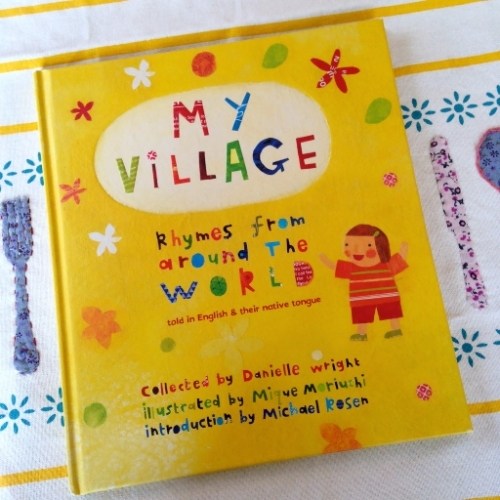
Isn’t it wonderful when one good thing leads to another?
Because I loved Mique Moriuchi’s charming illustrations in Irene Latham’s new poetry book Fresh Delicious, I zipped over to her website to see more and happily found My Village: Rhymes from Around the World (Frances Lincoln, 2015), which features twenty-two verses collected by New Zealander Danielle Wright.

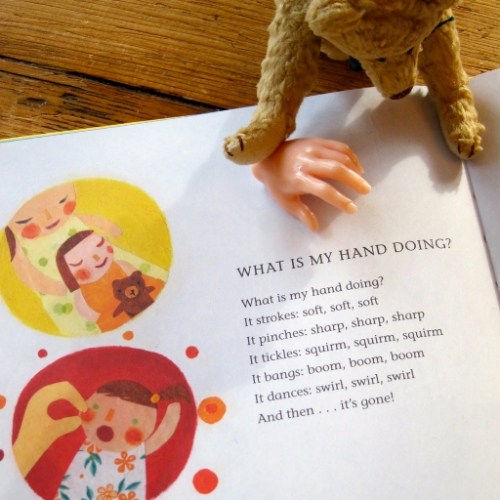
What makes this collection especially interesting is that the poems are presented in their native languages alongside an English translation. So we travel to fascinating places from New Zealand to Norway, Jamaica to Japan, and Indonesia to Iran, reading some of the very first rhymes children in those countries learn.

Animals are a favorite topic (whales, donkeys, monkeys, pigs, birds, mice), along with everyday activities that naturally fall into a child’s frame of reference no matter where he/she might live (playing in the rain, losing a tooth, flying kites, bath time, eating!). As former UK Children’s Laureate Michael Rosen points out in his excellent Introduction,
[Nursery rhymes] are a strange mix of poems: some are fragments of longer songs and ballads, some are rhymes that were probably oral jingles or chants that people sang or said to their children, a small group are carefully composed little poems with known authors, and some are songs that always accompanied dancing or actions of some kind.
I was happy to find a food poem from Fiji about tapioca that’s meant to be sung to the tune of “Frère Jacques”:
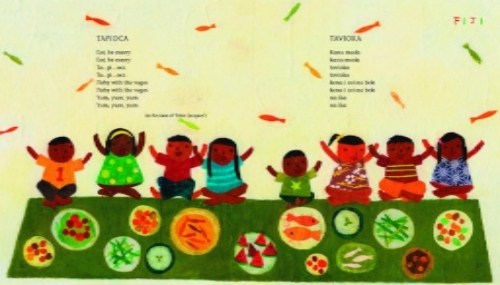
TAVIOKA
Kana mada
kana mada
tavioka
tavioka
kena i coi na bele
kena i coi na bele
na ika
na ika
TAPIOCA
Eat, be merry
Eat, be merry
Ta..pi..oca
Ta..pi..oca
Fishy with the veges
Fishy with the veges
Yum, yum, yum
Yum, yum, yum
*
Tapioca has replaced yams as a favorite staple in Fiji. It’s usually boiled and eaten with stews and curries. It reminds me of the Hawaiians’ love of taro. 🙂
I also liked this verse from Samoa, which is actually an excerpt from a classic song often taught in primary school English classes and to those learning Samoan for the first time. Fun blend of both languages:
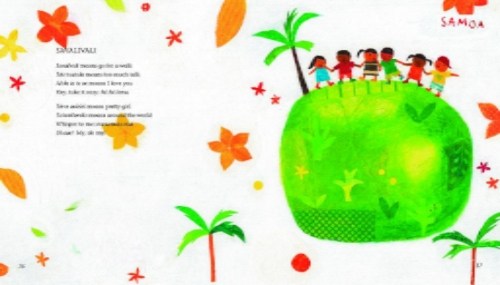
SAVALIVALI
Savalivali means go for a walk
tele tautala means too much talk
Alofa ia te oe means I love you
Hey, take it easy: tai tai lemu.Teine aulelei means pretty girl
Ta’amilomilo means around the world
Whisper to me: musumusu mai
Oi aue! My, oh my!
*
As Mr. Rosen also mentions, nursery rhymes can become life long companions if we learn them when we are very young. Being exposed to the words, sounds and rhythms of multiple languages at an early age is such a nice way to enrich a child’s poetic DNA.
Finally, I loved “Snowman Frost” from Denmark. It’s from a poem by Halfdan Rasmussen — a sweet, poignant narrative perfect for this time of year, when the Spring thaw is not far off.

SNEMAND FROST
Snemand Frost og Frøken Tø
gik en tur ved Søndersø
fandt en bænk og slog sig ned,
talte lidt om kærlighed.Snemand Frost, som var lidt bleg,
spurgte: “Må jeg kysse dig?”
Men da frøken Tø var varm
smeltede hans højre arm.Da han kyssed’ hendes kind,
svandt han ganske langsomt ind.
Da han kyssed’ hendes mund
blev han væk i samme stund.På en bænk ved Søndersø
sidder stakkelts frøken Tø.
Snemand Frost er smeltet op;
Hun må ha ham i en kop!
SNOWMAN FROST
Snowman Frost and Lady Thaw
Went for walks and thought of more.
Found a garden seat and sat,
Talked of love and this and that.Snowman Frost, a little weak,
Asked her, “May I kiss your cheek?”
But as Lady Thaw grew warm
He began to lose his form.As their passion rose in heat
Off he melted from the seat.
When he kissed her tender lips
He slipped through her fingertips.All alone without ‘amore’
On the seat sits Lady Thaw.
Snowman Frost no more will hug;
She must keep him in a mug!

*
Translating poems is tricky at best, and I was impressed with how well most of these poems scanned, and how the translators were able to create end rhymes and capture the energy and emotional essence of each poem, whether funny, playful, touching, or cheeky.
It would have been nice if a pronunciation guide was included, and if each of the poems’ languages was identified. It’s reasonable to assume a poem from Japan is in Japanese, but what about a poem from Switzerland, where there are several official languages? Is Maori something you recognize at first glance? There is some information in the Credits and Acknowledgements, but not all the languages are mentioned.


Still, this is a lovely celebration of cultural diversity with universal themes, and I love Mique Moriuchi’s colorful child-centric collages for each country’s double page spread — a most welcome feast for the eyes. 🙂
*

⛄ MELTING SNOWMAN COOKIES 🌞
Mr. Cornelius and I felt sorry for the poor snowman. What do you do when a snowman is melting? Make Melting Snowman Cookies, of course!
We decided on Nigella’s Chocolate Shortbread Cookies — a very rich, decadent buttery delight that is sinfully delicious all on its own (probably the best chocolate cookie I’ve ever eaten). We then drizzled some melted white chocolate onto each cookie before adding mini peanut butter cups for the snowman’s hat, mini chocolate chips for his eyes, and a diagonally sliced piece of orange Starburst candy for his carrot nose.*


Some have used Reese’s peanut butter bells for the hats, which would have been easier, but they’re only available during the holiday season. Mary at Home is Where the Boat Is had the idea of cutting up mini pb cups to make the hats and that worked out fine. You need a sharp knife and an “easy-does-it” slicing technique to keep the cups from crumbling.

You can basically use any cookie recipe you like, and if you don’t have or like white chocolate, you can substitute white bark coating/almond bark which comes in squares or sometimes melting discs. Just be sure to allow the coating to cool a bit so the peanut butter cups don’t melt. The best time to add the decorations is when the coating is cool but still tacky.


*For Starburst noses: slice each square into three rectangles, then slice those again until you have six rectangles. Slice each rectangle diagonally to form 12 noses. (More tips at Frugal Coupon Living.) 🙂

Now, grab a mug of hot chocolate and toast your favorite snowman. We love him when he’s here, but usually hope he doesn’t overstay his welcome. Like Lady Thaw in the poem, we’d be content to keep him in a mug the rest of the year. 🙂

*

MY VILLAGE: Rhymes from Around the World
collected by Danielle Wright
illustrated by Mique Moriuchi
published by Frances Lincoln Children’s Books, 2015
(first published in Australia and New Zealand by Gecko Books in 2008)
Multi-lingual poems for ages 3-6, 64 pp.
*Includes Introduction by Michael Rosen
*
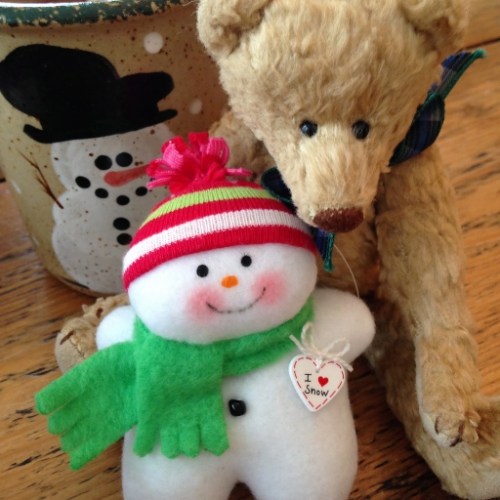
📙SPECIAL BOOK GIVEAWAY!📕
For a chance to win a brand new copy of My Village, simply leave a comment at this post telling us what your favorite language (other than English) is no later than midnight (EST) Wednesday, March 2, 2016. You can also enter by sending an email with SNOWMAN in the subject line to: readermail (at) jamakimrattigan (dot) com. Giveaway open to U.S. residents only, please. Winner will be announced next Friday. Good Luck!
*
🎉 FRESH DELICIOUS GIVEAWAY WINNER!🎈
Are you ready to hear the name of the lucky person who’ll be receiving a free copy of FRESH DELICIOUS?
hmmm, la la la la di da . . .
Oh yes, where were we? The winner, the winner — right!
🍏 Drum roll, please. 🍎
And the winner is
🎊 DEBBIE FULMER!! 🎊
Hooray! Congratulations, Debbie!
*back flips* *cartwheels* *somersaults*
Please send along your name and address so we can get the book out to you lickety split.
Thanks to everyone for all the great comments. Yes, FRESH DELICIOUS is totally awesome!
And now, I must go lie down. All this excitement at my age . . . 🙂
*
 The lovely and talented Liz Steinglass is hosting today’s Roundup. Take her some cookies and check out the full menu of poetic goodies on this week’s menu. (Help! I’m m-e-l-t-i-n-g!)
The lovely and talented Liz Steinglass is hosting today’s Roundup. Take her some cookies and check out the full menu of poetic goodies on this week’s menu. (Help! I’m m-e-l-t-i-n-g!)
Do you have snow on the ground right now where you live? Do you remember the very first snowman you ever made?
——————————————————–
*Interior spreads posted by permission of the publisher, text copyright © 2015 Danielle Wright, illustrations © 2015 Mique Moriuchi, published by Frances Lincoln Children’s Books. All rights reserved.
Copyright © 2016 Jama Rattigan of Jama’s Alphabet Soup. All rights reserved.

Ooh! Love the idea of poems from around the world! (And I wish you were givig away those chocolate shortbread cookies! LOL) My favorite language, other than English, is Japanese – for what i hope is an obvious reason! 😉
LikeLike
Those are delicious chocolate cookies — no need for frosting or icing of any kind really.
Arigato! *bows*
LikeLiked by 1 person
Yipee!
This tour of our beautiful world & inventive children was a gift to me under the tree in December – from our daughter Anna in Boston. She asked a bookseller there for something for a Mom who lives childeren’s picture books, poetry & has a world view.
I can lost myself in this artwork.
As a fan of Irene’s poetry, it’s extra fun to know the connection.
I am so tickled with this wonderful post. And tasty, post!
LikeLike
What a nice coincidence! Anna got good advice from that bookseller. 🙂 Totally agree about Mique’s artwork — there’s such joy in them. Did you know she also sells knitted and felt items (adorable animals)?
LikeLike
So much love for “Snowman Frost”! Adorable poem. It’s hard to pick a favorite illustration, but “If this street were mine” is really lovely. You outdid yourself with those cookies. !
LikeLike
I love Snowman Frost — a sweet poem but kind of sad too.
LikeLike
I’m so glad I stopped by to learn about this delightful book! I love books with an international flavor, and this helps me imagine children playing around the world. Favorite language? I know un pequito espanol, but I am of Danish descent, and really love the snowman poem. 🙂
LikeLike
Hi Jane! So glad you stopped by. Glad you liked the snowman poem too. I had fun trying to pronounce the Danish words. 🙂
LikeLiked by 1 person
Cannot read or speak Danish in spite of trying. My grandma taught me “tak” for “thanks” though, which is an important word in every language.
LikeLiked by 1 person
The book looks and sounds wonderful, Jama. And of course the cookies must taste delightful! I love “SAVALIVALI”, and its illustration is beautiful. “Snowman Frost” is another one I’ll be sure to share. Favorite language, French, mais oui! Et merci, aussi!
LikeLike
Bonjour, Linda!
Savalivali is such a fun song. I meant to post this video:
LikeLike
The artwork is lively, and the poems ARE charming, but I agree that to be useful – which is what we want other than to just be entertained – geographical information would have been nice, as some countries have multiple indigenous peoples and languages.
Now the Fijian song is in my head. ☺
LikeLike
Sounds like you need to eat some tapioca this weekend. 🙂
LikeLike
What a perfectly charming book. I love the idea of this collection. AND I love the melting snowman cookies. Cute! Please don’t include me in the drawing. I am packing and moving and don’t need anything else to pack.
LikeLike
We need more internationally oriented poetry collections. 🙂 Good luck with your move!
LikeLike
Every single time without fail when I visit Jama’s Alphabet Soup I leave with a big smile on my face and a craving for a delicious treat. I’m heading over to Twitter to give a shout out for this wonderful title you’ve highlighted today Jama. Thank you for filling the world with joy.
LikeLike
Glad you’re smiling — Mr. C and the Snowman send you big hugs! And thanks for tweeting!!!
LikeLike
Français est la plus belle langue, je crois. 🙂 Merci pour le “giveaway” -and for sharing this lovely and very charming book of International poetry!
♡♥
LikeLike
Merci beaucoup for commenting!! French was the language I studied in school :).
LikeLike
What a cool book! I want one. Thanks as always for enticing us with a sweet, nourishing dish.
LikeLike
It’s very interesting to read poems in their native languages — even if I don’t have a literal understanding of all the words, I still appreciate the rhythm of the words and the musicality of the verses.
LikeLike
I’ll have to make sure i track this book down – it looks so fun and insightful!
LikeLike
Worth a look!
LikeLike
It’s a lovely and bittersweet idea to write about Snowman Frost and Lady Thaw. It looks like a delightful global romp. I love the melted snowman cookies. I might have to try them sometime. I might have to use licorice for the hat, though, because one of my kids has a peanut allergy. Happy Poetry Friday!!
LikeLike
I’ve seen some people use marshmallows for the hat too. 🙂
LikeLiked by 1 person
Or chocolate covered caramels cut to size. Yum.
LikeLike
So interesting to see these poems side by side, Jama – languages are fascinating, and especially so to see the versions side by side. Snowman Frost was rather sad, but those melted snowman cookies look delightful!
LikeLike
Yes, I liked seeing the languages side by side too, and have new respect for translators. 🙂
LikeLike
Jama, I must say, Mr. C. has a rather ghoulish streak–that disembodied hand kind of freaked me out! 😉
We (my Library) have a book of Halfdan Rasmussen’s poems called A Little Bitty Man and Other Poems for the Very Young. It was illustrated delightfully by Kevin Hawkes. Published by Candlewick in 2011. If you don’t find it in your neck of the woods, let me know and we’ll ILL it for you!
LikeLike
For some reason Mr. C is fascinated by that little pack of body parts he got in his stocking last Christmas. There’s a foot, an ear, and a nose too! He does like Thing from the Addams Family, so maybe that’s part of it.
I’ll check my library for the book. Wasn’t familiar with Rasmussen before. Thanks for the offer. 🙂
LikeLike
Wow and YAY! I’ll send you my info right away.
I also love the idea of this book. When MiniPlu was in 1st grade she took a beginner Chinese class that was technically aimed at kids from native-speaking homes, but was still easy enough that we non-natives could manage (it was the last year we could do that). Every week they had to memorize a new poem. Since we really had no idea what most words were, it was mostly just going by the sound of the syllables, not the meaning, but it was fun to do anyway – kind of like the way I learned to sing in Maori and Tahitian.
My favorite spoken language is German, that being the one I’m best at (after English); I could recite Lewis Carroll’s “Jabberwocky” in German if you like. 😉 (Thanks to Zen and the Art of Motorcycle Maintenance for the translation.) But I’m also awfully fond of ASL – no idea how the concept of rhyming translates there, if it does at all….
LikeLike
Jabberwocky in German? Quite impressive!
It is fun to try to pronounce unfamiliar words phonetically. I like that they used poetry in that beginning Chinese class! And I didn’t know you could sing in Maori and Tahitian! Hidden talents!
Congrats again and enjoy Fresh Delicious!
LikeLike
Thank you, Jama, for sharing this book and more of Mique Moriuchi’s sweet artwork. Those cookies are too cute!
LikeLike
Thanks for stopping by to read, Catherine! Have a nice weekend. :)!
LikeLike
How interesting to see the original language with the translation. And I love that snowman poem (the cookies look yummy too). Thanks for sharing!
LikeLike
It was fun typing out and trying to pronounce those Danish words!
LikeLike
Thanks for sharing poems from My Village. What a treat. The snowman poem was genius. And.those.cookies!!! I want some.
My favorite language? Goodness. I don’t speak another language (well, pig Latin) but I love to hear other languages spoken. I’ll go with German. My father-in-law speaks German every now and then and I love it.
LikeLike
Yay! Glad you like the snowman poem. I love hearing other languages spoken too (have you heard Colin Firth speak Italian?). 🙂
LikeLiked by 1 person
You should get a commission — I just ordered this book, a must-have for my multi-multi-MULTIcultural classroom!
And those cookies! And Cornelius posing with the Snowman! LOVE!!
LikeLike
Yay! Glad to hear you ordered this book. Don’t know how I missed it before. Cornelius and the Snowman are best buds. 🙂
LikeLike
Goodonya for doing your research (especially the melty snowman kind… I imagine you had to taste a few options to get the face and hat just right). Seriously though, I also love Mique Moriuchi’s artwork in Fresh Delicious and wondered what else she’s done. My favorite language other than English is Strine. (Does that count?)
LikeLike
Strine? What’s that? (I live a very sheltered life.)
I’ve enjoyed seeing more of Mique’s work — it’s definitely happy-making. As for “research” of the foodie kind — it’s hard work but somebody’s gotta do it :).
LikeLike
Ha! (The “goodonya” was a clue.) Strine is Aussie slang. With a broad accent “Australian” is pronounced “Strine.” Seriously, google it. I would go into more detail myself, but I’m flat out like a lizard drinking. 😉
LikeLike
Oooh, I’m drooling…. What a beautiful book and a fun post.
“Mag ich ein Schokoladenplätzchen bitte haben?” (That’s “May I have a chocolate cook please?” in German – the only other language with which I have even a platonic relationship)
LikeLike
Thanks for the German treat! Please help yourself to as many cookies as you like. 🙂
LikeLike
Oops – No, ‘May I have a chocolate cookie please…”
LikeLiked by 1 person
Thanks for introducing this book! I love that those intriguing other languages are presented. And your clever melting snowman cookies! My favorite is French but I have to say, that Samoan looks tantalizing!
LikeLike
Samoan sounds like a fun language to learn. I was exposed to a little of it when I lived in Hawai’i. 🙂
LikeLike
What a great idea for a book! I may have to get this for my three-year-old nephew. Favorite language: Chinese, even though I only studied it for a few months. I love the way it sounds. Xie xie.
LikeLike
Impressed that you know Chinese! Those inflections always seemed so daunting to me.
LikeLike
Emphasis on “a few months,” Jama. 😉
LikeLike